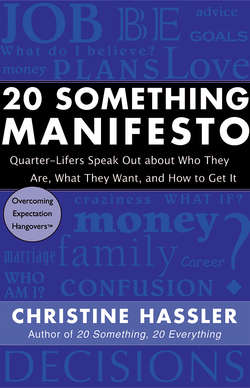Читать книгу 20 Something Manifesto - Christine Hassler - Страница 46
На сайте Литреса книга снята с продажи.
Оглавление| 3. | BASIC SELF-AWARENESS |
“The hardest thing for me about being twenty something was the pain of figuring out who I really was. After I graduated from college and met the biggest goal in my life, I felt lost. I had a severe ‘What now?’ crisis.”
Web developer, 30, married, Colorado
For many of us, we are finally thrust into the real world after college graduation, when for the first time we have to figure out who we are outside the walls of a school and our parents’ home, and sometimes far away from our familiar hometown. Adjusting to being on our own for the first time is stressful. Do we maintain the roles we’ve developed up to now? Do we try to live up to the expectations and hopes others have for us? Who are we, anyway? And, as if this identity crisis wasn’t enough — we have to juggle all the unfamiliar, practical problems of surviving independently.
For me, graduation led to a time of tremendous confusion over who I was. Without the well-defined “good student” identity and structure of college, I was lost. I knew who I was in the land of academia, but I struggled to know who I was as an adult on my own. I needed a new identity, so like many other twenty somethings in the Basic stage, I sought out a career and a relationship. I thought these would answer the question, “Who am I?” And yet, at twenty-three, though I was on a successful career track and dating a Hollywood guy who was exposing me to the good life, I was sad, empty, and didn’t really know what to do about it.
In the Basic stage on the Self-Awareness Continuum, twenty somethings often report feeling fear, anxiety, confusion, sadness, and even depression. They frequently feel they have trouble keeping up and adjusting to the responsibility of carving out their own lives. Some say they exhaust themselves trying to live up to everyone’s expectations, burning out as they push their bodies and minds past their limits. Others are overwhelmed with loss and sadness: they miss college life, both the status they enjoyed and the community, and they feel like small, lost fish in a very big pond.
“I feel like I am at an in-between place; I have broken off from my family and my close-knit community in college, and I’m on my own in the real world. What is my role? I’m not a student; I’m not a spouse; I’m not a parent. . . . I’m just whoever I make myself to be. This is both freeing and frightening.”
Industrial engineer, 25, single and hate it, Minnesota
In the Basic stage, we often cling to our roles and use them to define ourselves: “I am a nursing student, a son, a waitress, an engineer, an alumnus, a girlfriend, an athlete.” We also frequently identify ourselves by our characteristics and desires, by our likes and dislikes: “I play soccer, I love music, I’m a redhead, I care about the environment.” This is natural. For two decades others have labeled us and identified us in these ways, and we are only just figuring out what we think of ourselves.
